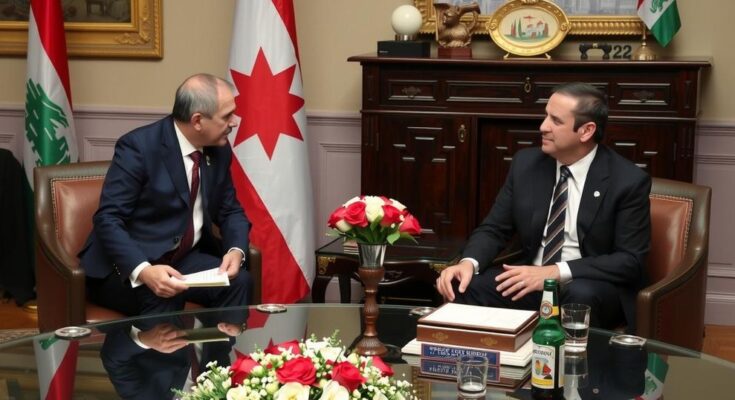Lebanon’s caretaker Prime Minister Najib Mikati met with Syria’s Ahmed al-Sharaa in Damascus, discussing bilateral challenges including border security and smuggling. This marks the first visit of a Lebanese PM to Syria in 15 years, highlighting efforts to enhance cooperation on issues like Syrian refugees in Lebanon, amidst a backdrop of complex historical relations between the two countries.
On Saturday, Lebanon’s caretaker Prime Minister Najib Mikati embarked on a significant visit to Damascus, marking the first trip by a Lebanese prime minister to Syria in 15 years. During a joint press conference with Syria’s de facto leader Ahmed al-Sharaa, the leaders addressed critical issues concerning the two nations, including border smuggling and the delineation of maritime and terrestrial boundaries. Mikati emphasized the importance of collaboration between Beirut and Damascus to enhance security along their shared borders, reiterating a commitment to tackle illicit activities that have troubled both countries.
Discussions included addressing smuggling, particularly arms and drugs, which has increased tensions between the two nations. Al-Sharaa expressed optimism for a long-term strategic partnership, contingent on Lebanon’s political stability following the election of a new president. Mikati’s government must manage the influx of approximately 1.5 million Syrian refugees, a burden exacerbating Lebanon’s frail economy, rooted in the aftermath of years of civil conflict in Syria.
Furthermore, the visit underscored the complicated history between the two nations, particularly Syria’s past military presence in Lebanon lasting nearly three decades until 2005. The revival of diplomatic dialogues could signify a shift toward more cooperative relations as both countries navigate shared challenges and opportunities for mutual benefit.
The socio-political landscape remains sensitive; thus, both leaders have committed to establishing workgroups to ensure a systematic approach to solving their existing problems. The ramifications of al-Assad’s regime on Lebanon’s current political dynamics and Syrian refugees’ implications on stability remain paramount in their discussions.
The recent meeting between Lebanon’s Prime Minister Najib Mikati and Syria’s de facto leader Ahmed al-Sharaa in Damascus marks a pivotal moment in Lebanese-Syrian relations, particularly after a lengthy period of political tension. Lebanon currently hosts a substantial population of Syrian refugees due to the civil war that erupted in Syria in 2011, which has significantly impacted Lebanon’s economy. The history of Syrian influence in Lebanon has been complicated, rooted in military presence and political manipulation leading up to Syria’s withdrawal in 2005. This meeting represents potential strides toward re-establishing a working relationship, focusing on practical issues like border security and refugee management.
In conclusion, the meeting between Prime Minister Najib Mikati and Ahmed al-Sharaa in Damascus heralds a significant opportunity for Lebanon and Syria to address pressing bilateral challenges, notably border security and the handling of Syrian refugees. The leaders’ commitment to collaborate on strategic matters may pave the way for improved relations, reflecting a broader need for stability and cooperation in the region. As both nations navigate a complex socio-political landscape, their shared interests and historical ties will play a crucial role in shaping future dialogue and partnership.
Original Source: www.aljazeera.com




